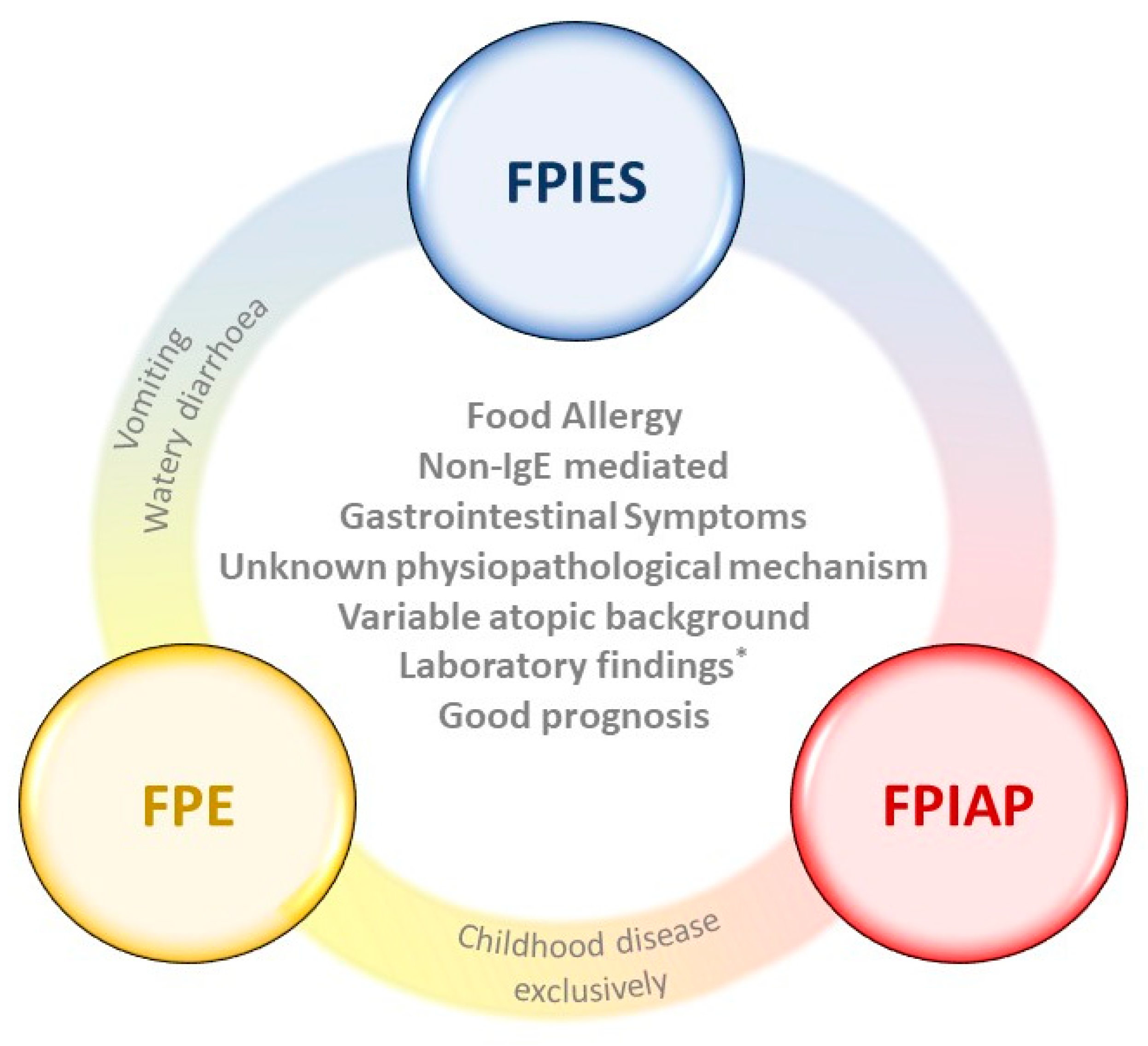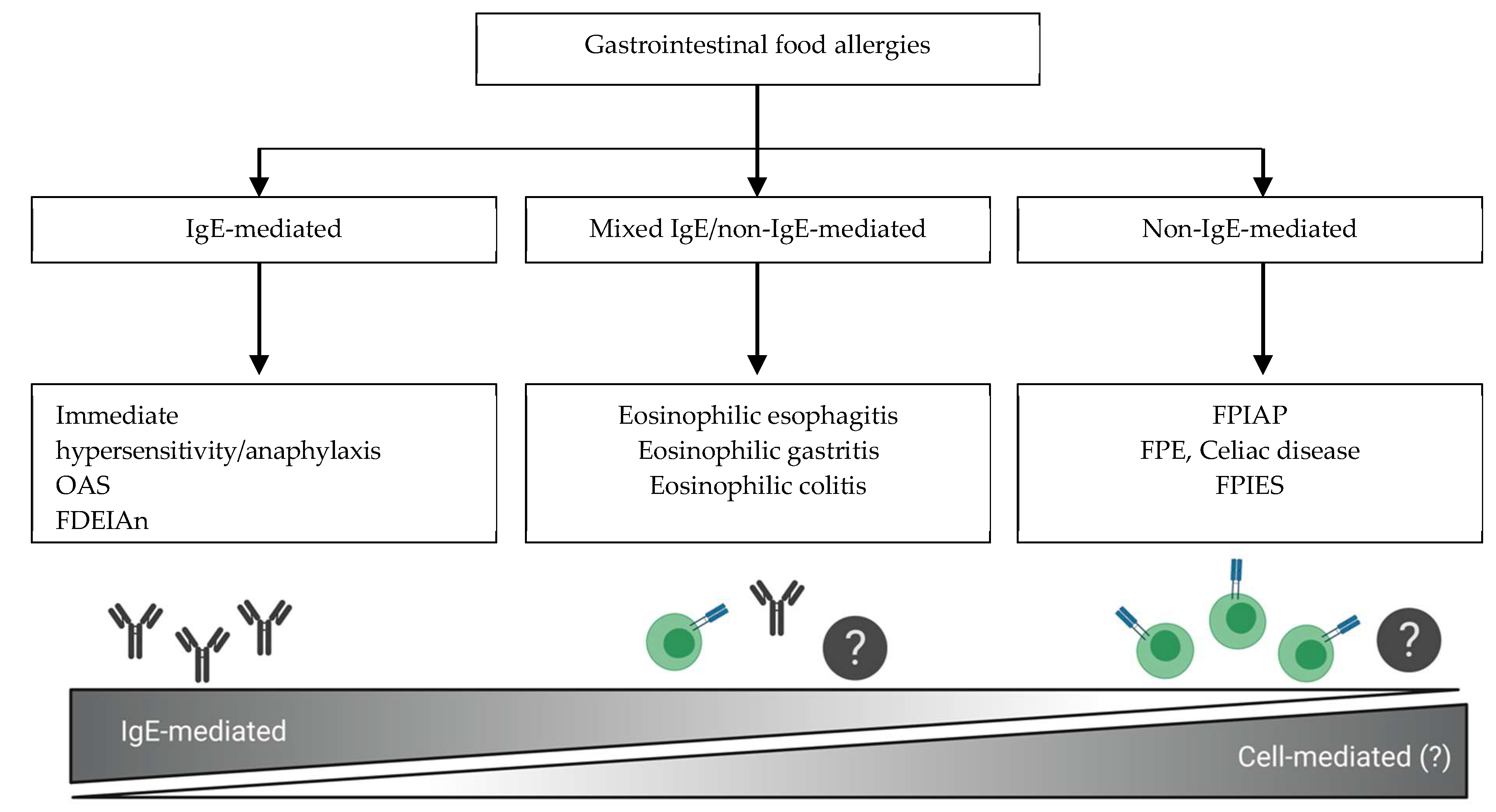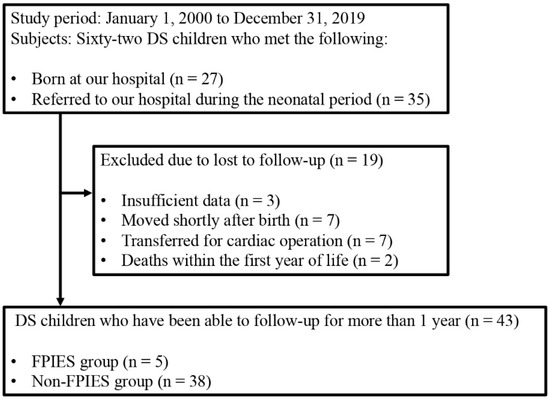food protein-induced enterocolitis syndrome a review of the new guidelines
3 Diagnosis of FPIES is difficult. 3 Diagnosis of FPIES is difficult.

International Consensus Guidelines For The Diagnosis And Management Of Food Protein Induced Enterocolitis Syndrome Executive Summary Workgroup Report Of The Adverse Reactions To Foods Committee American Academy Of Allergy Asthma Immunology Journal
High-quality studies providing insight into the pathophysiology diagnosis and management are lacking.

. Food protein-induced enterocolitis syndrome FPIES is a poorly understood non-IgE gastrointestinal-mediated food allergy that predominantly affects infants and young children. Reactions are characterized by the delayed onset of gastrointestinal symptoms predominantly repetitive vomiting which is often severe and should be considered a medical emergency. Acute food protein-induced enterocolitis syndrome FPIES is a non-IgE-mediated allergy and is characterized by repetitive profuse vomiting episodes often in association with pallor lethargy and diarrhea presenting within 1-4 h from the ingestion of a.
Despite the potential seriousness of reactions awareness of FPIES is low. The first International Consensus Guidelines for the Diagnosis and Management of Food Protein-induced Enterocolitis Syndrome were published in 2017 and reviewed epidemiology clinical presentation and prognosis of acute and chronic FPIES. The first International Consensus Guidelines for the Diagnosis and Management of Food Protein-induced Enterocolitis Syndrome were published in 2017 and reviewed epidemiology clinical presentation and prognosis of acute and chronic.
Food protein-induced enterocolitis syndrome FPIES is a rare food allergy that affects the gastrointestinal GI tract. Shortly after he lies limp in her arms as his skin turns blue. Food proteininduced enterocolitis FPIES is a non-IgE cell-mediated food allergy that can be severe and lead to shock.
Food protein-induced enterocolitis syndrome FPIES is a nonIgE-mediated food allergic disorder that can manifest with symptoms of projectile repetitive emesis that can be followed by diarrhea and may be accompanied by lethargy hypotonia hypotension hypothermia and metabolic derangements. Food ProteinInduced Enterocolitis Syndrome The Hidden Scourge of GI Food Allergies By Judith C. Seafood-induced FPIES may start in adulthood.
Cells of the innate immune system appear to be activated during an FPIES reaction. Acute FPIES typically presents between one and 4 hours after ingestion of the trigger food with the principal. And clinical outcomes are poorly established.
Cells of the innate immune system appear to be activated during an FPIES reaction. 1 FPIES usually starts in infancy although onset at older ages is. A mothers 6-month-old son eats rice cereal for the first time.
The term enterocolitis specially refers to inflammation of the small and large intestines. Individuals with FPIES experience profuse vomiting and diarrhea that usually develops. The first International Consensus Guidelines for the Diagnosis and Management of Food Protein-induced Enterocolitis Syndrome were published in 2017 and reviewed epidemiology clinical presentation and prognosis of acute and chronic FPIES.
Up to 10 cash back Food protein-induced enterocolitis syndrome FPIES is an increasingly recognized non-immunoglobulin E IgE-mediated reaction to food. 12 This syndrome is typically characterized by profuse vomiting and lethargy occurring classically 14 hours after ingestion of the offending food. Onset is typically during the first year of life.
Through collaborative efforts of researchers and patient organizations today much more is known about EoE and standards for diagnosis and management have changed. Food protein-induced enterocolitis syndrome FPIES is an uncommon disorder characterized by an allergic reaction to food that affects the gastrointestinal system. Acute FPIES typically presents between one and 4 hours after ingestion of the trigger food with the principal.
Food protein-induced enterocolitis syndrome. Food protein-induced enterocolitis syndrome FPIES is a non-IgE mediated food allergy presenting in infants younger than 12 months. Food protein-induced enterocolitis syndrome in the long term Ten years ago eosinophilic esophagitis EoE was considered to be a disease of early childhood outgrown by age 3.
The first International Consensus Guidelines for the Diagnosis and Management of Food Proteininduced Enterocolitis Syndrome were published in 2017 and reviewed epidemiology clinical presentation and prognosis of acute and chronic FPIES. Food protein-induced enterocolitis syndrome FPIES is an allergic disease probably non-IgE-mediated with expression predominantly in the GI tract. Thalheimer RD LDN Todays Dietitian Vol.
The most characteristic symptom is. Acute FPIES manifests within 1-4 hours after. Food protein-induced enterocolitis syndrome FPIES is a poorly understood non-IgE gastrointestinal-mediated food allergy that predominantly affects infants and young children.
While the pathophysiology of FPIES is poorly understood the clinical presentation of acute FPEIS reactions has been well characterized. Food proteininduced enterocolitis syndrome FPIES is a poorly understood nonIgE gastrointestinalmediated food allergy that predominantly affects infants and young children. Food protein-induced enterocolitis syndrome FPIES is a severe presentation of non-IgE-mediated food allergy affecting the gastrointestinal GI tract mainly in infants and young children.
Unlike most food allergies symptoms of FPIES do not begin immediately after eating. Acute FPIES typically presents between one and 4 hours after in -. The workgroup outlined clinical phenotypes proposed diagnostic criteria and made recommendations on management.
Download Table Empiric guidelines for selecting weaning foods in infants with FPIES 1 from publication. The workgroup outlined clinical phenotypes proposed diagnostic criteria and made recommendations on management. Instead it can take hours before severe symptoms begin.
Food protein-induced enterocolitis syndrome FPIES is a severe presentation of non-IgE-mediated food allergy affecting the gastrointestinal GI tract mainly in infants and young children. 1 2 This syndrome is typically characterized by profuse vomiting and lethargy occurring classically 14 hours after ingestion of the offending food. Cells of the innate immune system appear to be activated during an FPIES reaction.
Food proteininduced enterocolitis syndrome FPIES is a nonIgE- cell-mediated food allergy of unknown prevalence and pathophysiology. 5 rows Food protein-induced enterocolitis syndrome FPIES is a non-IgE mediated food allergy.

Manifestations Diagnosis And Management Of Food Protein Induced Enterocolitis Syndrome Pediatric Annals

Clinical Manifestations Of Food Protein Induced Enterocolitis Syndrome Download Scientific Diagram

References In Food Protein Induced Enterocolitis Syndrome Not So Rare After All Journal Of Allergy And Clinical Immunology

Nutrients Free Full Text Non Ige Mediated Gastrointestinal Food Allergies In Children An Update Html

Management Of Acute Food Protein Induced Enterocolitis Syndrome Emergencies At Home And In A Medical Facility Annals Of Allergy Asthma Immunology

Food Protein Induced Enterocolitis Syndrome Annals Of Allergy Asthma Immunology

Nutrients Free Full Text Food Protein Induced Enterocolitis Syndrome In Children With Down Syndrome A Pilot Case Control Study Html

Interpretation Of The Food Protein Induced Enterocolitis Syndrome Oral Download Table

Pdf Food Protein Induced Enterocolitis Syndrome A Review Of The New Guidelines

Food Protein Induced Enterocolitis Syndrome Oral Food Challenge Annals Of Allergy Asthma Immunology

Food Protein Induced Enterocolitis Syndrome The Journal Of Allergy And Clinical Immunology In Practice

Clinical Types Of Food Protein Induced Enterocolitis Syndrome Fpies Download Scientific Diagram

Clinical Types Of Food Protein Induced Enterocolitis Syndrome Fpies Download Scientific Diagram

Pdf Nutritional Management Of Food Protein Induced Enterocolitis Syndrome

Emerging Triggers Of Food Protein Induced Enterocolitis Syndrome Annals Of Allergy Asthma Immunology

Gastrointestinal Immunopathology Of Food Protein Induced Enterocolitis Syndrome And Other Non Immunoglobulin E Mediated Food Allergic Diseases Sciencedirect

Oral Food Challenge In Food Protein Induced Enterocolitis Syndrome Download Table

Foods Free Full Text Non Ige Mediated Gastrointestinal Food Protein Induced Allergic Disorders Clinical Perspectives And Analytical Approaches Html